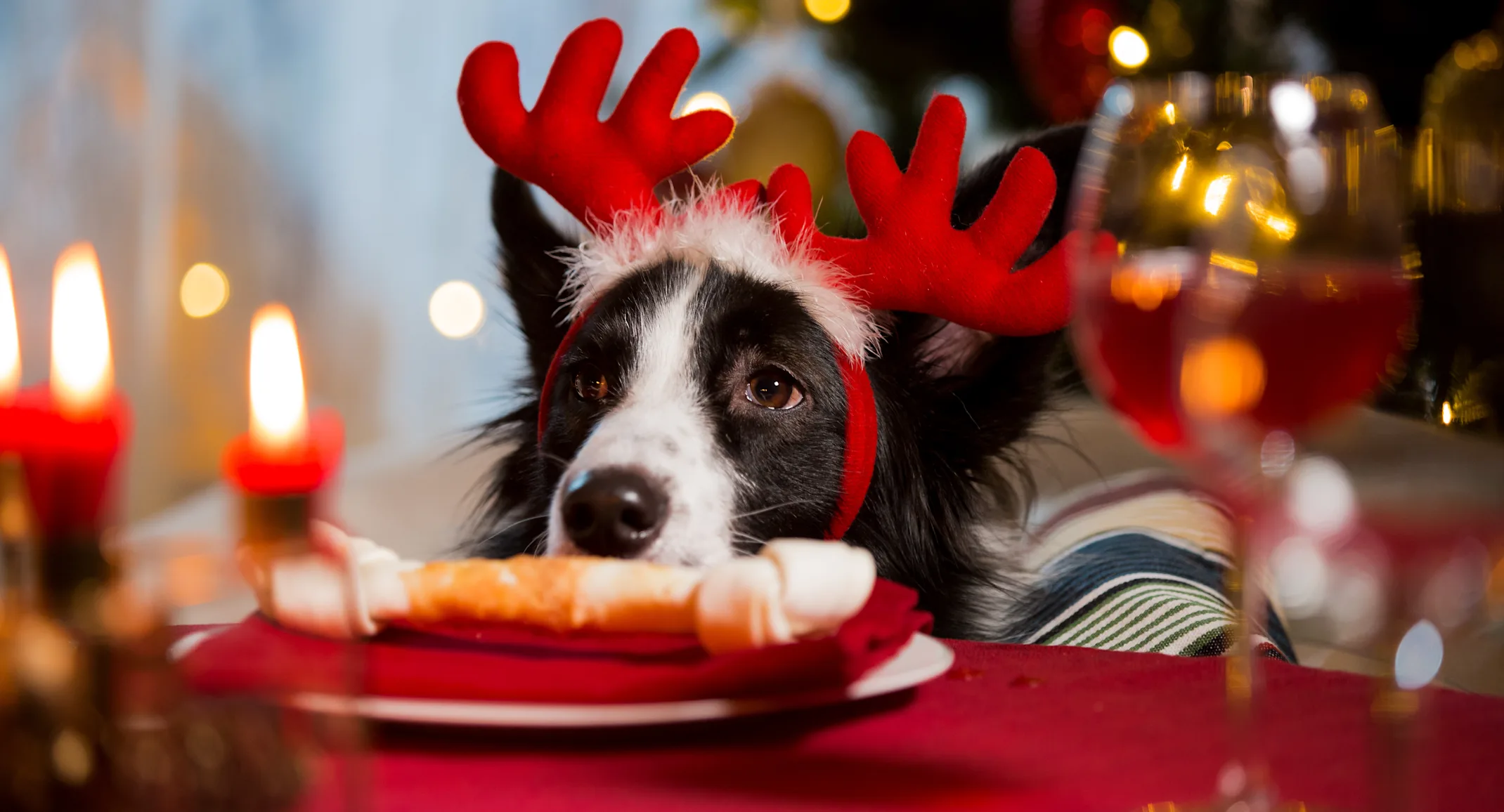3 Tips for Preventing Common Holiday Pet Emergencies
Pet Safety

NOV 19, 2019
The holidays are stressful and chaotic, and you may not have considered how different routines, foods, and decor could affect your furry friend. A pet emergency could ruin your holiday faster than a fruitcake at a family gift exchange. The holiday season is a busy time at Red Bank Veterinary Hospital’s emergency rooms, and although we are happy to provide 24-hour emergency care to New Jersey and New York pets, we would rather your loving companion stay safely at home with you during the holidays.
To keep a pet emergency from ruining your holiday festivities, follow these helpful tips:
#1: DON’T SHARE HOLIDAY FOODS WITH YOUR PET
Sharing your holiday feast may seem like a good way to show your furry friend how much you love her, but causing a bout of pancreatitis, or worse, a toxic reaction, is anything but loving. Many foods that are safe for human consumption can cause problems for dogs and cats, and should never be shared. If you want to spoil your pet, stick to pet-safe treats. Stay away from these foods, in particular:
Meat scraps — Skin, gristle, and fat from your holiday turkey or roast are fatty treats that can cause dangerous pancreatitis. You pet’s pancreas helps her digest fats, and a high-fat meal causes a surge in pancreatic enzymes that can cause acute pancreatic inflammation. Pets with pancreatitis often need hospitalization with intravenous fluids and medications to recover from the severe vomiting, abdominal pain, and dehydration.
Bones — Bones from your decadent meal can splinter, crumble, or break into pieces, and should never be fed to your pet. Once in her gastrointestinal (GI) tract, bone fragments can puncture her stomach or intestinal wall, or cause a blockage.
Chocolate — Two toxins—theobromine and caffeine—can cause GI, cardiac, and neurologic problems for pets who ingest chocolate. Dark chocolate, or baking chocolate, contains the highest toxin concentration, although milk chocolate can also cause toxicity if your pet eats enough.
Grapes and raisins — Grapes, raisins, and some currants, which are often small, black grapes, are toxic to dogs, and can cause acute kidney failure. All grape products, including grape juice, wine, cookies, cereal bars, and raisin bread can cause toxicity and must be kept away from your pet.
Alcohol — If your pet sneaks a drink from a cocktail glass or laps up a spilled alcoholic drink, the alcohol can be rapidly absorbed into her bloodstream and cause dangerously low blood pressure, blood sugar, and body temperature.
Raw yeast dough — Raw dough containing yeast can expand in your pet’s warm stomach and cause GI upset or a dangerous blockage. Yeast fermentation can also produce alcohols, which can cause alcohol toxicity.
#2: CHOOSE PET-SAFE CHRISTMAS DECORATIONS
As you put up the tree and hang garland, your curious pet may think the decorations are new toys. Take care to keep these potential hazards out of your pet’s reach:
Ornaments and garlands — If your frisky cat or rough-housing dog knocks a glass ornament off your tree, she could lacerate her foot and require sutures. Some homemade ornaments and garlands made from food items, like popcorn or dough, can be enticing for pets, who may try to eat the decorations and cause the tree to fall over.
Tinsel — Cats are often tempted to eat tinsel’s glimmering strands, and they may develop a life-threatening intestinal blockage or perforation.
Electric cords — Puppies and kittens may chew on electrical cords, and can be electrocuted or severely burnt if they chomp down on the internal wires.
Candles — If your playful pet knocks over a lit candle, she could be burnt, and the open flame could cause a devastating house fire.
#3: SHARE HOUSEHOLD RULES WITH YOUR GUESTS
Let houseguests know if your pet will be mingling during the festivities, and share your concerns about potential holiday dangers. Ask them to refrain from feeding her party treats, and set out a special jar of pet-friendly treats for party-goers who can’t resist trying to make friends with your pet. Let your guests know that only you should let your pet out for potty breaks to prevent her from going into an unfenced area where she could get loose.
Ask overnight visitors to keep the guest-room door closed so your curious pet does not rummage around in their luggage. According to the ASPCA Animal Poison Control Center, human medication ingestion is the most common cause of pet toxicity. Prescription and over-the-counter medications pose a hazard to your pet and must be stored out of her reach.We wish your family a wonderful, safe holiday season. If, despite your best efforts, a pet emergency arises outside your family veterinarian’s normal office hours, you can contact us for emergency treatment 24 hours a day, seven days a week, including holidays.
